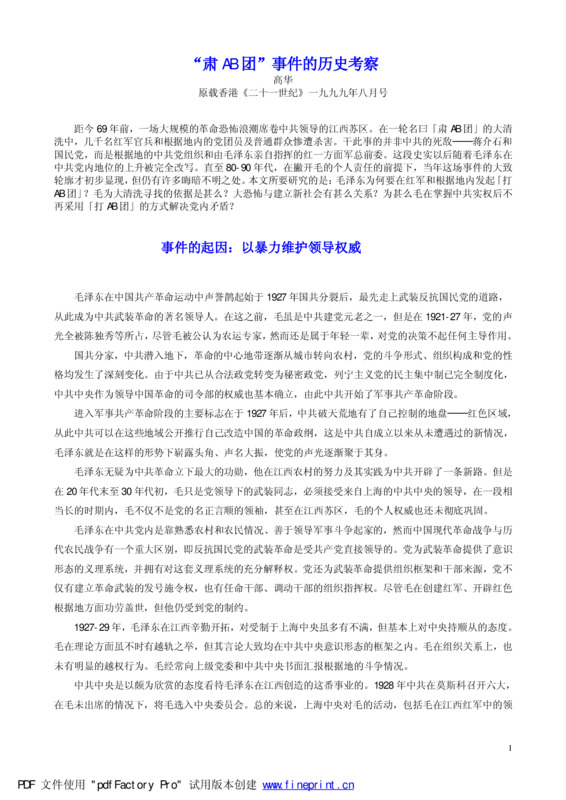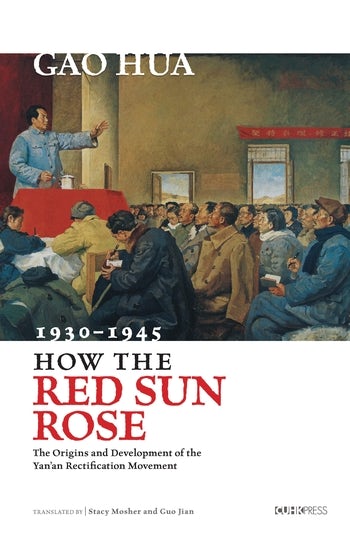Explore the collection
Showing 7 items in the collection
7 items
Book
At the Crossroads of History
This book is Gao Hua's next masterpiece after *How the Red Sun Rose*. It entails a selection of papers published by the author between 1988 and 2004, covering the fields of Republican history, Communist Party history, and contemporary Chinese history. It captures the historical interaction between the present and the past. Gao reflects deeply on the far-reaching Chinese Communist Revolution. With a rigorous and empirical research methodology, he sketches a complex and colorful picture of history, presenting the multiple facets of twentieth-century China's history.
Article
Historical Examination of the Purge of the "AB" Regiment
More than 70 years ago, a massive wave of revolutionary terror swept through the CCP-led Jiangxi Soviet Union. Thousands of Red Army officers and soldiers, as well as members of the Party and the general public in the base area, were brutally murdered in a purge called the "Purging of the AB Troupe." Gao Hua's article examines why Mao Zedong initiated the "purge of the AB Group" in the Red Army and the base areas. What was Mao's rationale for the Great Purge? What is the relationship between the Great Terror and the establishment of a new society? Why did Mao stop using the "Fighting the AB Groups" as a means of resolving internal conflicts in the Party after he assumed real power in the CCP?
Book
How the Red Sun Rose
Originally published in Hong Kong in Chinese in 2000, Gao Hua’s epic description of an early Communist Party campaign against dissent describes a pattern of thought reform and control that would hold true for decades to come. Written despite official harassment and Gao’s failing health, How the Red Sun Rose is a touchstone for China’s unofficial history movement. It was translated into English in 2019 and published by Columbia University Press. Purchase here: https://cup.columbia.edu/book/how-the-red-sun-rose/9789629968229.
Book
The Realm of Historiography
This book is a compilation of some of Gao Hua's speeches, book reviews, commentaries on current affairs, reviews of student papers, and lecture transcripts. It includes his studies and reflections on themes around revolution, civil war, and nationalism, his comments on the works of Long Yingtai, Wang Dingjun, and Mao Zedong, and his observations on Taiwan's social and political realities during his visits to Taiwan. In addition, the book contains a selection of Gao Hua's lecture notes on the theory and methodology of historiographical research, as well as on the production of official historical narratives and the development of folk history, enabling readers to gain further understanding of the philosophy and methodology behind Gao Hua’s research.
The book was published by Guangxi Normal University Press in November 2015 before the fourth anniversary of Gao Hua's death, for which the publisher was disciplined by the Central Propaganda Department and the State Administration of Press, Publication, Radio, Film and Television.
Article
“China Labour Bulletin” Report Series on Labor Rights Protection in China
2025年6月12日,位于香港的NGO组织“中国劳工通讯”发布声明解散。这是香港《国安法》落地后又一个停运的中国民间团体。中国劳工通讯(China Labour Bulletin,CLB)于1994年成立,致力于推动中国劳工运动,长期关注中国劳工权利。该机构总部位于香港,创办人韩东方是1989年天安门民主运动中的工人领袖,是当时北京工人自治联合会创始人之一。
中国劳工通讯曾出版数十份中英文报告,涉及中国的工人运动,关注农民工、外卖骑手、女工、童工、煤炭开采和尘肺病等工人权益问题。在该机构宣布解散后,“中国劳工通讯网”也随即被关闭。民间档案馆网站紧急下载了其网站上相关的49个中文报告,予以留存。以下32个报告是中国劳工通讯2004-2024年之间发布的关于中国劳工权益保障的研究报告,包括《中国外卖行业研究报告》、《建筑行业权益报告》、《医护行业权益报告》、《制造业工人权益报告》、《中国工人十年集体行动启示》等。
文章
China Labour Bulletin Report Series on Trade Union Reform
On June 12, 2025, the Hong Kong–based NGO China Labour Bulletin (CLB) announced its dissolution. This marks yet another Chinese civil society organization that ceased operations following the implementation of the Hong Kong National Security Law. Founded in 1994, CLB was dedicated to promoting the Chinese labor movement and had long focused on labor rights in China. Headquartered in Hong Kong, its founder Han Dongfang was a workers’ leader during the 1989 Tiananmen Democracy Movement and one of the founders of the Beijing Workers’ Autonomous Federation.
Over the years, China Labour Bulletin published dozens of reports in Chinese and English on China’s labor movement, addressing issues related to migrant workers, food delivery couriers, women workers, child labor, coal mining, and pneumoconiosis, among others. Following the organization’s dissolution, the China Labour Bulletin website was also taken offline.
In response, the China Unofficial Archives website immediately downloaded and preserved 49 Chinese-language reports from the site. The following 17 reports are studies concerning trade union reform in China.
图书
#MeToo in China Archives 2018.1-2019.7
On New Year's Day 2018, Beihang University graduate Luo Xixi took the lead in breaking China's silence on the issue of sexual harassment when she publicly reported on social media that Beihang professor Chen Xiaowu had sexually harassed her. This was the first major event in China’s #Metoo movement, which has since spread from colleges and universities to other fields. #Metoo provoked an unprecedented discussion in China, and the issues of feminism and sexual harassment attracted a rare and widespread attention, with a variety of complaints, comments, studies, and advocacy articles springing up all over the internet.
<i>#MeToo in China Archives 2018.1-2019.7</i> is a compilation of sexual harassment-related articles written between January 2018 and July 2019. This archive is massive, totaling more than 2,500 pages, and is divided into three main volumes: “#Metoo in Higher Education”, “#Metoo in other fields”, and “#Metoo discussions’. Volume I and Volume II consist of individual #Metoo cases, arranged in chronological order. Articles in volume 3 can be broadly categorized into general reviews, investigative reports, personal stories, advocacy and activism, tools and resources,etc. During the #Metoo movement, many liberal public intellectuals questioned the movement, likening it to big-character posters during the Hundred Flowers campaign, and arguing that it might lead to the proliferation of wrongful convictions. It triggered heated debates, and this archive also contains a number of related articles.
The process of compiling this archive itself became an act of resistance, given the severe repression on freedom of expression and social movements. The editorial team faced tremendous challenges in collecting articles that had been deleted or published as images to bypass online censorship. It spent a great deal of time and personnel piecing together scraps of information and transcribing words in images. Reading traumatic personal stories - including those about the hardships in seeking remedies - caused psychological trauma for the editors themselves.
Nevertheless, #Metoo has also a process of collective healing, in which women with shared experiences saw each other, realized the structural problems behind sexual violence, and gained the strength to move on and push for change. Finally, during the compilation process, the editorial team also benefited from archiving efforts made by other websites and individuals, demonstrating that the rescue and preservation of people’s history is a collective and collaborative task.
This archive is published on https://chinesefeminism.org/.





